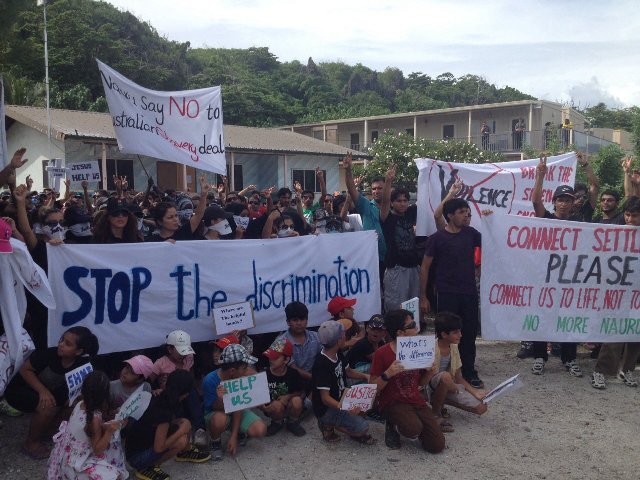 Previous protests have taken place over Australia's treatment of refugees [picture: Refugee Action 2016]
Previous protests have taken place over Australia's treatment of refugees [picture: Refugee Action 2016]
As Australia began to shut down its hugely controversial offshore immigration detention centre on Manus Island, the several hundred detainees remaining launched legal action to stop Canberra removing basic services such as water and electricity, claiming their human rights were being infringed. The migrants have been collecting rainwater since the utilities were cut off. Meanwhile, locals on the island, off Papua New Guinea (PNG), had blocked roads to prevent the construction of new accommodation for refugees, the Guardian reported. Australia and PNG had failed to protect the 770 refugees, a Human Rights Watch report claimed. They were being stabbed, beaten and robbed on Manus and many now refused to leave the centres, said HRW, which called for Australia to transfer them there.
Three weeks after the centre was closed, about 400 men had still refused to leave and urged Australia to accept an offer by New Zealand’s new prime minister, Jacinda Ardern, to take in 150 refugees, Radio New Zealand said. An Iranian journalist, Behrouz Boochani, said: ‘Please let us to go to New Zealand. We are tired from being in this prison for more than four years.’ A Sudanese refugee told RNZ that the world was watching Australia deprive its detainees of food and water: ‘Is this the government that claimed it won a seat on the [UN] Human Rights Council? Is this how you treat people?’
Migrants on Manus who were applying for resettlement in the US had been offered, amid much distrust among the refugees, the chance to volunteer to transfer to Australia’s other offshore detention centre in Nauru. The Nauruan government claimed the Manus refugees were settling in well but gave no details of numbers, according to Radio New Zealand. Nauru’s minister for multicultural affairs, David Adeang, claimed allegations of human rights abuses within the Australian detention centre on Nauru were ‘falsities represented as facts’, according to RNZ, which noted that despite the minister’s complaining about a lack of interest in reporting the truth about Nauru, the government demanded a visa application fee of no less than $6,000 for journalists. For similar reasons, only two reporters had been to Manus to report on the situation, according to Al-Jazeera, which suggested Australia was ‘pulling the media strings’ to shut down the story. ‘There are real reasons to believe that there is a blacklist for Australian journalists. Australia certainly has a long history of stifling reporting on immigration detention centres,’ a BuzzFeed reporter told the broadcaster, which said journalists relied on information sent out by refugees using smuggled phones.
Australia’s policy of shutting its borders and keeping refugees far offshore is rooted in the hardline approach instituted by Tony Abbott. As the Sydney Morning Herald noted, the former prime minister, an outspoken Catholic who trained to be a priest, took issue with the biblical injunction of ‘love they neighbour as thyself’ and, as he explained in a 2015 speech to the British Conservative Party, urged European countries to follow his policy of halting the tide of refugees by almost any means to ‘control their own borders against those who are no longer fleeing a conflict but seeking a better life’. He told the audience at London’s Guildhall: ‘This means turning boats around, for people coming by sea. It means denying entry at the border for people with no legal right to come; and it means establishing camps for people who currently have nowhere to go. It will require some force; it will require massive logistics and expense; it will gnaw at our consciences – yet it is the only way to prevent a tide of humanity surging through Europe and quite possibly changing it forever.’ One ‘top Tory’ calling the speech ‘fascistic’, the right-wing Guido Fawkes blog reported.
As Sasha Polakow-Suransky argued in the Guardian, Australia’s policy under Abbott is a role model for the far-right in Europe, which believes it is waging an existential struggle against the forces of Islam, led by refugees from Syria, Afghanistan etc. The author of a new study on the rise of nativist xenophobia, ‘Go Back to Where You Came From: The Backlash Against Immigration and the Fate of Western Democracy’, he suggests: ‘Australia’s appeal is that it is an advanced western democracy that has managed to morally and legally outsource the processing and resettlement of refugees to poor island nations in the Pacific, where they are warehoused far from the prying eyes of the media and a population that might show them sympathy.’



